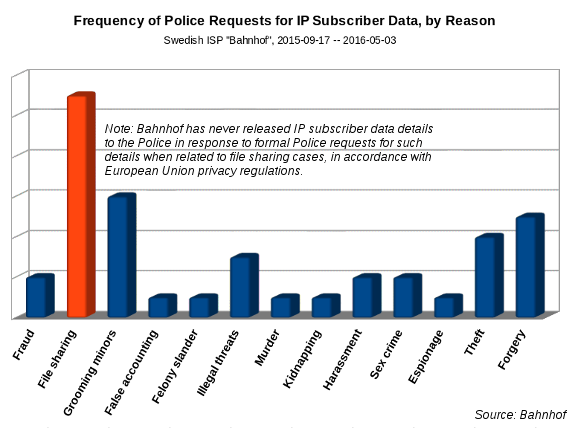While police complain about the shortage of resources, it is the "crime" the most studied on the net is ordinary people sharing music and movies with each other. This is in stark contrast to the perception of everyday life person area of justice, where distribution monopoly laws command less respect than even the speed limit [1] . According to the ISP, the police are provably spend expensive resources on useless little nothings.
For the first time, an ISP publishes statistics of what crimes the police investigation for the release of Internet identities of subscribers. The so-called data retention, which is a government requirement to store communications data for everyone to use it against them in the future, has been justified as necessary to fight against organized crime and terrorism - but is now being used against ordinary share music and movies, according to ISP.
"We want to publish these statistics to show the police are violating privacy and expenses of people resources on useless trifles," said Jon Karlung, CEO of Bahnhof.

"We can also say that these requests come from several different locations within the police force," Karlung continues. "We noted fifty different personal email accounts to send requests, and five different groups of addresses, fax and even six more requests."
Bahnhof notes that file sharing is by far the type of "crime" as leader asked the police to request release of subscriber identities.
However, the ISP Bahnhof was a hard life about privacy, and pointed to the European regulations privacy, not releasing the data for crimes considered "not serious", which usually means crimes punishable by fines or under six months in prison. therefore, Bahnhof just refused to release the identities of subscribers would -Share files, against the instructions of the police and the Swedish telecommunications Authority. This behavior Bahnhof currently making its way through the courts, which should be completed by the European Court of justice, which is the court that first established privacy safeguards.
It is particularly noteworthy that the police has by far the most requests for the ordinary file sharing to ISPs despite what ISP releasing this data to share common files - you assume the police able to learn. One could then speculate on the frequency with the least conscious ISP, assuming it to be higher. Unfortunately, the vast majority of Internet service providers are not willing to take the police of their country to the European Court of Justice on fundamental privacy.
So the police are the priority in investigations against trade violations distribution monopoly on just about any other crime, and are sending requests by fax. You can not get a more descriptive picture of the legal digital divide.
[1] studies by prof. Roger Wallis, KTH, 05.
Disclosure :. The author is a high class consumers rate customer with this particular ISP

0 Komentar